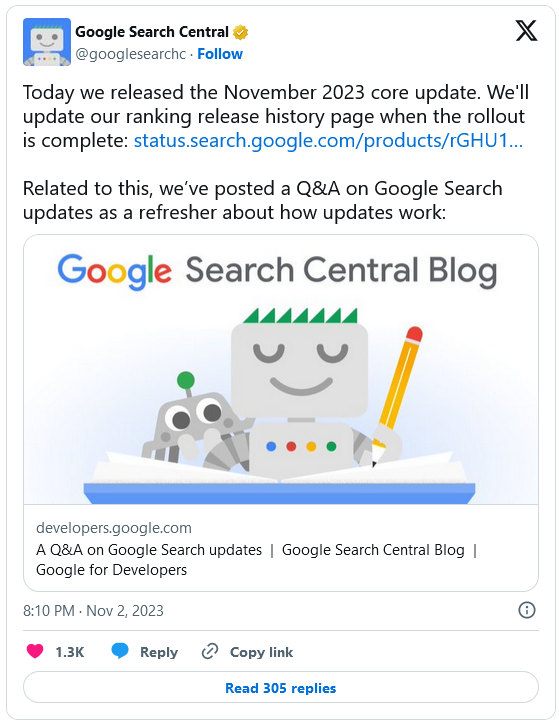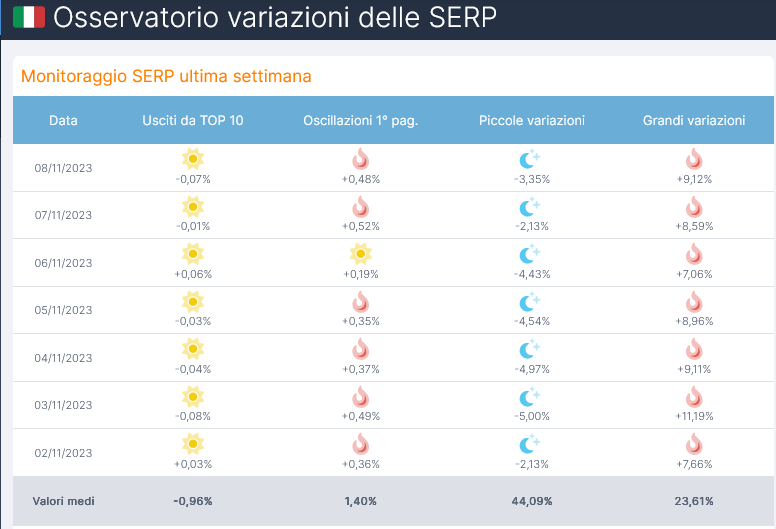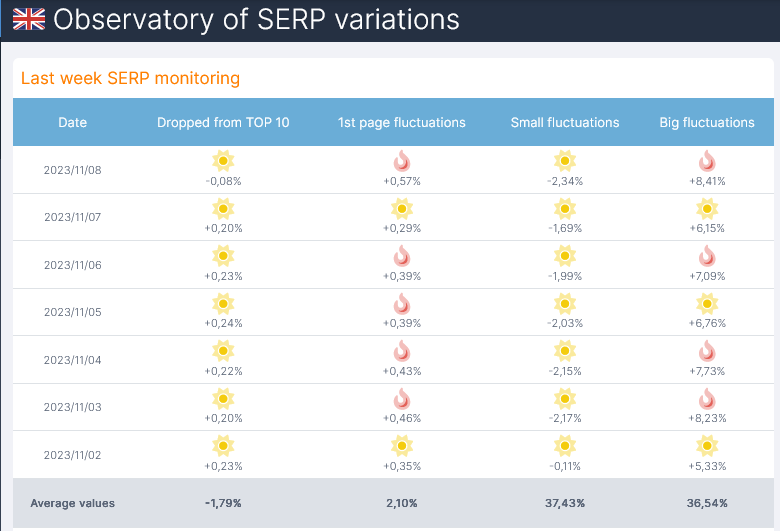News at Google’s: all the upcoming updates
A “spam update,” a “review system update,” and as many as two core updates just if we look at the last month, while if we widen the time horizon a little bit we find another core update and a relevant “helpful content system update.” The last quarter at Google has definitely been eventful, and perhaps it has been difficult to keep up with all the news and announcements that have come out of Mountain View in this period, so it is useful to do some sorting out and also try to understand why we are dealing with this great frenzy, which inevitably messes up our work as well.
What’s happening at Google’s: the November 2023 Core Update
Let’s start with the certain information. Last Thursday, November 2, the international and global release of the November 2023 Core Update kicked off, the implementation of which, as is the case with most Google core updates, takes about two weeks.
This is the fourth broad core update of the year 2023 and the eighth official Google algorithm update of the year 2023, but it is not the last, as we will soon see.
This update was even more of a surprise than usual, both in terms of timing and effects: first, it follows by just a month the previous intervention – October 2023 Core Update, which, moreover, was only officially completed on October 19 – and then, as also reported by Barry Schwartz, it also immediately seemed much stronger and more impactful than the last few updates.
November 2023 core update was in fact incredibly strong and caused intense volatility in the SERPs in a very short time, and in truth the fluctuations were felt since several days before Google announced the update.
Even with SEOZoom we have confirmation of this intensity: our SERP Observatory indicates high temperatures on Google Italy, particularly for First Page Oscillations and Great Variations, and the same happens when analyzing Google UK.
Changes also for the Reviews system
A few days away, namely on November 8, Google also rolled out (yet another) update to the Reviews System, the algorithmic system that focuses on analyzing the quality of review content.
Moreover, as Danny Sullivan stated in a post on the Search Central Blog, this is also the last periodic notification about improvements to this complex system, which will continue to take place “at a regular and continuous pace”; major changes will affect the page describing how the system works.
Google responds to major concerns about updates
Also appearing in the same article is a useful list of “FAQs” related to Google’s handling of updates, which allow us to clarify a bit of the picture and the goals that the search engine is trying to achieve (in part) through this ongoing update activity.
First, Sullivan dwells again on the concepts and differences between ranking systems and updates: ranking systems are what Google uses “to generate search results,” each of which “does different things,” while updates or upgrades are called the enhancements to a ranking system.
We then move on to more preeminent issues, such as the question “Why does Google do updates?“: the answer is that even these sophisticated automated systems that serve to rank search results are not perfect, and Google remains always looking for ways to improve these mechanisms to show better results.
That this activity is growing is borne out by the numbers-as we also mentioned when talking about how Search works, nearly 5,000 actual launches were made in 2022-and Sullivan adds that not all updates are “shared” and communicated, because in many cases “they are relatively small and make incremental changes.” So the ones Google turns its attention to are the updates deemed noteworthy, to provide guidance in case sites see sudden changes: there were 10 in 2021, 10 in 2022, and about the same will be at the end of 2023, the guide says (and so there are at least two to go, by our count!).
Lately we have seen that there are notable overlapping updates. In principle, Google tries to separate the major updates so that site owners can better identify which system is involved in any changes in traffic and ranking. However, because there are so many updates overall, this is not always possible, and furthermore, Google cannot and will not wait to implement an update developed over several months that has already been evaluated and approved because it will improve Search. In this regard, Sullivan also specifies that on a general level Google tries to avoid releasing relevant updates during the holiday shopping season, the period from late November to mid-December, but this is not always possible precisely because the ultimate goal is to improve Search (as soon as possible).
But how does Google know that an update actually works to improve things? According to the Public Liaison for Google Search, the assurance comes from the fact that all possible changes to Search follow a rigorous evaluation process to analyze metrics and decide whether to actually implement the proposal.
What to do when there is a Google update
On the occasion, Sullivan also repeats some now “classic” advice for those who manage sites and observe (mostly negative) changes when there is a core update.
First, he reiterates, if there is an update “there is likely to be nothing for most creators who have already worked to create useful, reliable, people-centered content,” which are what Google’s systems seek to reward. Generally, if we work this way we will see updates that pass without any particular jolt, or that lead to better Search results.
If our traffic drops after a non-targeted spam update, there may be content issues to consider and act on. Far more problematic, however, is a negative change caused by a spam update, because in that case Google’s systems may have determined that the site was sending spam or benefiting from spam links that attempted to manipulate ranking.
But then, why are there so many updates?
Obviously, all these indications are purely “theoretical” and represent Google’s view on the subject, but they do not particularly delve into the reasons why the search engine implements so many updates nor do they clarify all the useful details.
To be sure, it has never happened before-say at least since 2018, since core updates are made official and “christened”-that we find ourselves with three major updates so closely spaced (apart from the 2021 June and 2021 July Core Updates, which, however, were the result of an already announced split), and this confirms the feeling that Google is insistently trying to improve the quality of its search results… without really succeeding, however.
Giuseppe Liguori, our CTO, talked about this at the recent Zoomday 2023 in Naples: core updates are changes to the search engine’s basic algorithm, i.e., the core (nucleus) that makes Google’s “core” systems and, on a general level, search ranking work.
Simply put: Google changes the rules of the game during the game.
If our site drops, it is not necessarily a penalty against us, but a reinterpretation of how Google has decided to order the SERPs: in these situations, some sites go down, other sites go up because they are deemed more “deserving.”
And yet, cases of recovery from an update even without having made any changes are not uncommon, because it is often easy to notice large inconsistencies in these “corrections,” which Google then further adjusted over time.
In short, the usual advice applies: “Don’t panic” and no frantic running around looking for a miracle “fix” to recover rankings. And, above all, keep an eye out for all variations!







